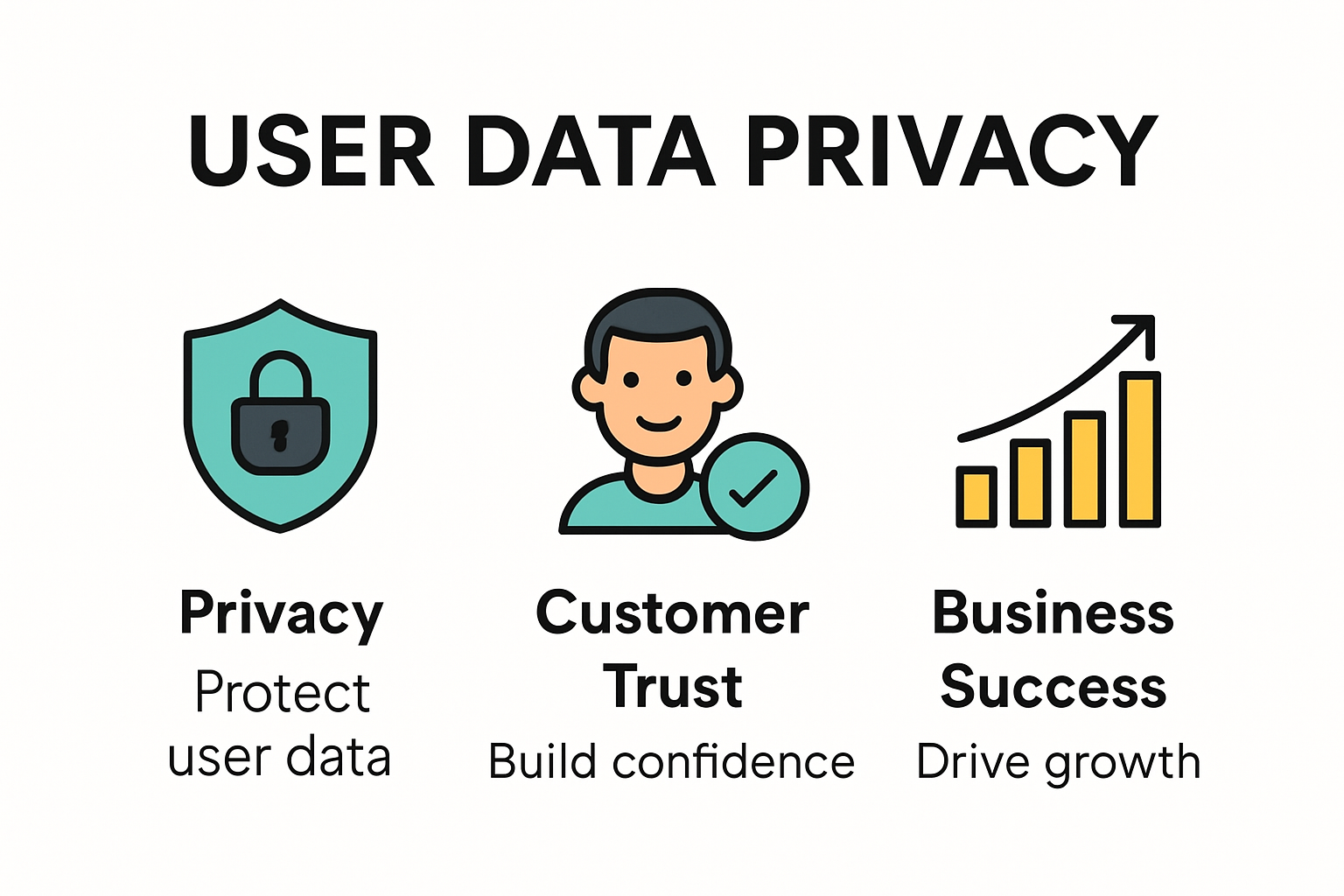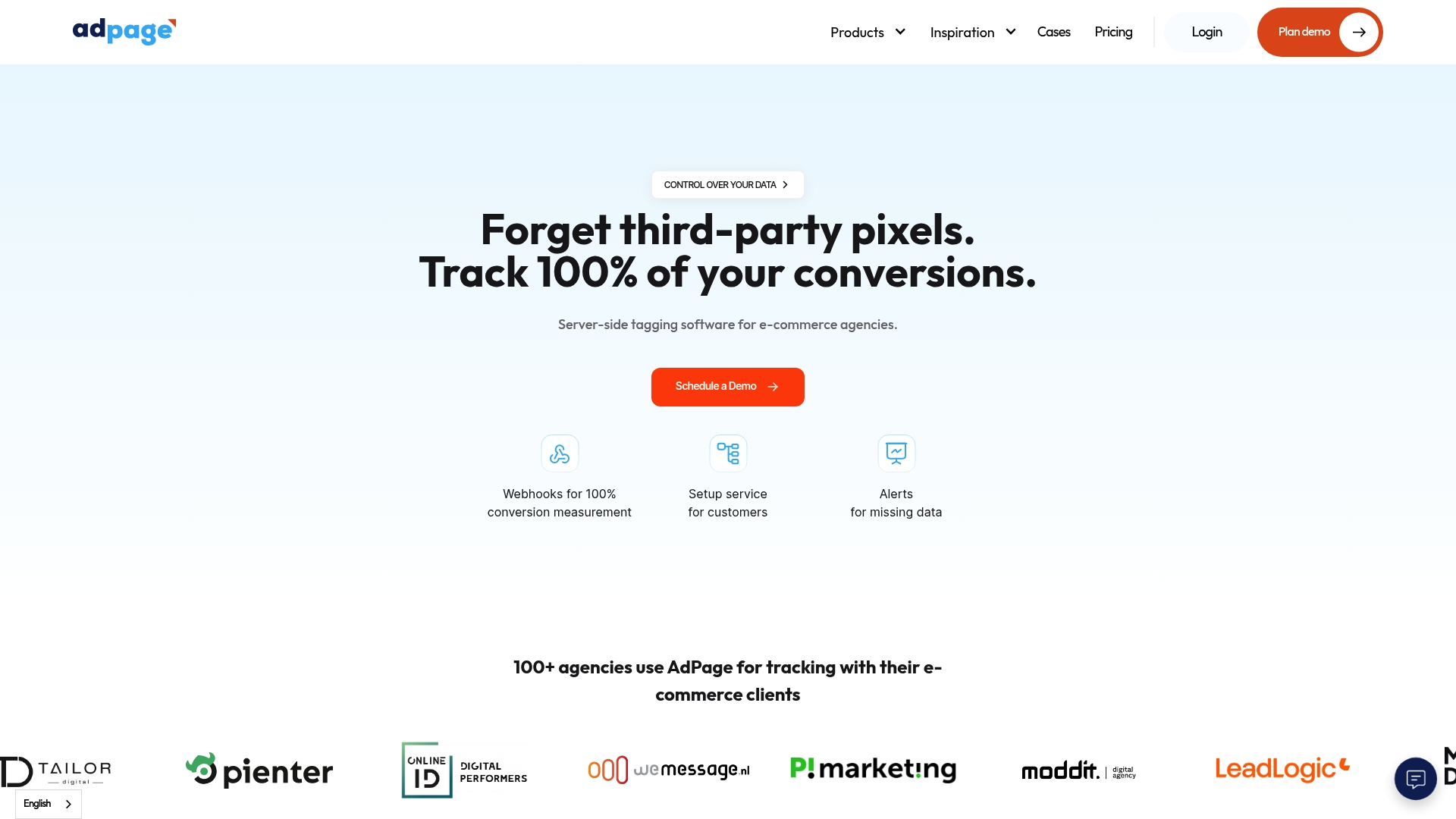User data privacy is quickly becoming the backbone of e-commerce. Here is something that might surprise you. The average cost of a single data breach soared to £4.45 million in 2023. Yet the real shock comes from what brands risk losing beyond fines and headlines. The difference between thriving and sinking often comes down to how strongly a business earns customer trust in their privacy practices.
Table of Contents
- Why User Data Privacy Matters For Digital Businesses.
- Key Regulations And Compliance In 2025
- Practical Steps To Secure User Data
- Boosting Conversion Rates With Privacy Best Practices
Quick Summary
| Takeaway | Explanation |
|---|---|
| Financial and Reputational Risks | Failing to protect user data can lead to severe financial penalties, loss of customer trust, and competitive disadvantages, highlighting the necessity for strong data protection strategies. |
| Evolving Regulatory Landscape | Understanding and complying with diverse, multi-jurisdictional data privacy regulations is crucial for sustainable business strategy, as non-compliance can lead to escalating penalties. |
| Proactive Security Measures | Implementing advanced authentication, comprehensive encryption, and continuous monitoring ensures robust user data protection and mitigates risks of breaches. |
| Privacy as a Competitive Advantage | Transparent data privacy practices can enhance customer trust and engagement, leading to improved conversion rates and customer loyalty. |
| Quantifying Privacy Impact | Measuring metrics like conversion rates and customer retention can help assess the effectiveness of privacy strategies and their impact on business performance. |
Why User Data Privacy Matters for Digital Businesses.
User data privacy has transformed from a technical consideration to a critical business imperative for digital enterprises. Understanding user data privacy means recognizing the complex ecosystem of trust, legal compliance, and customer relationship management that underpins modern online interactions.

The Financial and Reputational Stakes of Data Protection.
Digital businesses operate in an environment where a single data breach can obliterate years of brand reputation. Research from IBM reveals that the average cost of a data breach in 2023 reached £4.45 million, highlighting the substantial financial risks associated with inadequate data protection strategies.
Companies that fail to prioritize user data privacy expose themselves to multiple risks:
- Financial Penalties: Regulatory bodies impose significant fines for non-compliance with data protection regulations.
- Customer Trust Erosion: Consumers rapidly lose confidence in brands that mishandle their personal information.
- Competitive Disadvantage: Businesses perceived as untrustworthy struggle to attract and retain customers.
Legal Landscape and Regulatory Compliance
The regulatory environment surrounding user data privacy continues to evolve rapidly. According to Gartner, approximately 65% of the world's population will have modern privacy regulations covering personal data by 2025. This shift demands that digital businesses implement robust, transparent data management practices.
Key regulatory frameworks like GDPR and CCPA mandate strict protocols for:
- Obtaining explicit user consent
- Providing clear data usage explanations
- Enabling user rights to access and delete personal information
- Implementing secure data storage and transmission mechanisms
Building Customer Trust Through Transparent Practices.
Moredern consumers are increasingly sophisticated about their data rights. They seek businesses that demonstrate genuine commitment to protecting personal information. Transparent data privacy practices are no longer optional but a fundamental expectation.
Successful digital businesses recognize that user data privacy represents more than legal compliance. It is a strategic opportunity to differentiate themselves, build customer loyalty, and create meaningful, trust-based relationships. By prioritizing user data protection, companies can transform a potential liability into a competitive advantage.
The message is clear: understanding user data privacy is not just about avoiding penalties. It is about creating a responsible, ethical digital ecosystem that respects individual rights and builds long-term customer relationships.
Key Regulations and Compliance in 2025
The global data privacy landscape in 2025 represents a complex and rapidly evolving regulatory environment that demands unprecedented attention from digital businesses. Understanding user data privacy now requires comprehensive knowledge of multijurisdictional legal frameworks that continue to reshape how organizations collect, process, and protect personal information.
The Global Patchwork of Privacy Regulations
As digital ecosystems expand, regulatory approaches to data protection have become increasingly nuanced and region-specific. Reuters research highlights that by mid-2024, 19 states in the United States had enacted unique privacy laws, creating a challenging compliance landscape for businesses operating across multiple jurisdictions.
Key characteristics of this regulatory environment include:
- Fragmented Legal Frameworks: Each region develops distinct data protection requirements
- Increasing Complexity: Businesses must navigate multiple, sometimes conflicting regulations
- Strict Enforcement: Penalties for noncompliance continue to escalate dramatically
Emerging International Data Protection Standards
Global Privacy Assembly reports suggest that international data protection standards are converging around several core principles. The most significant developments include enhanced individual consent mechanisms, expanded definition of personal data, and more rigorous cross-border data transfer regulations.
Notable regulatory trends in 2025 encompass:
- Mandatory data protection impact assessments
- Enhanced individual rights to data portability
- Stricter requirements for algorithmic transparency
- More comprehensive definitions of sensitive personal information
Technological and Legal Convergence
China's Personal Information Protection Law represents a significant milestone in global data protection, offering a comprehensive framework that emphasizes individual consent and organizational accountability. This approach signals a broader international trend toward creating holistic, technology-neutral privacy regulations.
Businesses must now view data privacy not merely as a legal obligation but as a fundamental aspect of their operational strategy. The most successful organizations will proactively develop robust, adaptable compliance frameworks that anticipate regulatory changes and prioritize user trust.
The message is unequivocal: comprehensive understanding of user data privacy regulations is no longer optional. It is a critical component of sustainable digital business strategy in an increasingly interconnected and regulated global marketplace.
Practical Steps to Secure User Data
Securing user data requires a comprehensive and proactive approach that goes beyond basic compliance. Digital businesses must implement robust strategies that protect sensitive information while maintaining operational efficiency and user experience.
Advanced Authentication and Access Control
Cybersecurity experts from NIST recommend implementing multi-layered authentication mechanisms to significantly reduce unauthorized access risks. Multi-factor authentication represents a critical first line of defense in protecting user data.
Key authentication strategies include:
- Biometric Verification: Utilizing fingerprint, facial recognition, and other unique physiological identifiers
- Risk-Based Authentication: Dynamically adjusting authentication requirements based on user behavior and potential threat levels
- Time-Limited Access Tokens: Implementing temporary credentials with automatic expiration
Comprehensive Data Encryption and Protection
Research from Cybersecurity Ventures indicates that end-to-end encryption is no longer optional but a fundamental requirement for protecting user information. Businesses must implement robust encryption protocols across all data storage and transmission channels.
Critical encryption practices involve:
- Encrypting data at rest and in transit
- Using advanced encryption standards (AES-256)
- Implementing secure key management systems
- Regularly rotating encryption keys
Continuous Security Monitoring and Vulnerability Management
Cyber governance reports emphasize the importance of ongoing security assessment. Regular vulnerability testing and proactive system audits are essential for identifying and mitigating potential security weaknesses before they can be exploited.

Effective security monitoring requires:
- Automated threat detection systems
- Regular penetration testing
- Comprehensive logging and incident response protocols
- Continuous staff training on emerging cybersecurity threats
Successful user data protection is not a one-time implementation but an ongoing commitment to maintaining the highest standards of digital security. By integrating advanced authentication, comprehensive encryption, and continuous monitoring, businesses can create a robust defense against evolving cyber threats while maintaining user trust and regulatory compliance.
Below is a summary table that outlines the practical steps and example strategies businesses can implement to secure user data, as discussed above.
| Step | Example Strategies |
|---|---|
| Advanced Authentication & Access Control | Biometric verification, risk-based authentication, access tokens |
| Comprehensive Data Encryption & Protection | Encrypt data at rest/in transit, AES-256, key management, rotation |
| Continuous Security Monitoring & Management | Automated detection, penetration testing, logging & incident response |
| Staff Training | Ongoing cybersecurity awareness and education |
Boosting Conversion Rates with Privacy Best Practices
Privacy best practices are no longer a compliance checkbox but a strategic lever for improving digital business performance. Understanding how transparent data protection can positively influence customer behavior represents a critical competitive advantage in the contemporary e-commerce ecosystem.
Building Trust Through Transparent Privacy Mechanisms.
Research from Science Direct reveals that consumers who feel empowered to control their online privacy are more likely to engage with e-commerce platforms and respond positively to digital advertising. This counterintuitive insight suggests that robust privacy practices can directly enhance conversion potential.
Effective trust-building strategies include:
- Clear Consent Mechanisms: Providing granular, easy-to-understand privacy options
- Visual Privacy Indicators: Implementing recognizable trust badges and security certifications
- Transparent Data Usage Explanations: Describing precisely how user information will be utilized
Economic Impact of Privacy-Centric Design.
Experimental studies from ResearchGate demonstrate that some consumers are willing to pay a premium for enhanced privacy protections. This willingness indicates that privacy is not merely a regulatory requirement but a potential value-added service.
Key economic considerations encompass:
- Reduced cart abandonment rates
- Increased customer lifetime value
- Improved brand perception and customer loyalty
- Potential price premium for privacy-focused services
Quantifying Privacy Performance
Comprehensive research from ArXiv indicates that privacy regulations can impact website traffic and conversion rates. While initial implementations might temporarily reduce visitor numbers, long-term strategies that prioritize user trust can create sustainable competitive advantages.
Metrics for measuring privacy performance include:
- Conversion rate variations
- Customer retention rates
- Trust score assessments
- Comparative analysis of privacy-related user interactions
Successful digital businesses recognize that privacy is not a constraint but an opportunity. By transforming data protection from a technical requirement into a strategic differentiator, organizations can create more meaningful, trust-based relationships with their customers. The future of e-commerce belongs to those who can demonstrate genuine commitment to user privacy while delivering exceptional digital experiences.
Frequently Asked Questions
What is the importance of user data privacy in e-commerce?
User data privacy is crucial as it helps build customer trust, prevents data breaches, and ensures compliance with regulations. A strong focus on privacy can differentiate a brand and enhance customer loyalty.
How can businesses protect user data?
Businesses can protect user data by implementing advanced authentication methods, employing comprehensive data encryption, and maintaining continuous security monitoring to identify vulnerabilities.
What are the key regulations related to data privacy in 2025?
Key regulations include GDPR and CCPA, which mandate explicit user consent, clear data usage explanations, and the right for users to access and delete their personal information.
How does privacy impact conversion rates?
Privacy can significantly influence conversion rates; consumers are more likely to engage with platforms that offer transparent privacy practices and control over their personal data.
Take Control of User Data Privacy and Unleash E-Commerce Growth
If you are feeling the pressure from complex privacy regulations and data loss through traditional analytics methods, you are not alone. The article pointed out how the cost of a data breach and unclear consent management can quickly erode customer trust and damage your brand. When every conversion matters, and data privacy is tied directly to your success, you need a solution that turns compliance into your strongest advantage.

Upgrade your e-commerce tracking and privacy management today. Make every click count by switching to server-side tagging and consent management with AdPage. Experience accurate, GDPR-compliant conversion monitoring that integrates seamlessly with your favourite platforms. Visit AdPage's main site to learn how you can protect user data, boost trust, and improve conversion rates now. Choose confidence for your marketing today.



.png)
